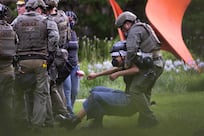Two weeks ago I attended a doctoral defence at Masdar Institute of Science and Technology in Abu Dhabi. This is when a doctorate student has to present and defend the research project they have been toiling away at for the past few years.
The doctoral defence is where doctors are made. The outcome of this cross-examination determines who ascends to educational level 8, the highest level there is, according to Unesco's International Standard Classification of Education, and who stays where they are. In the UK the same assessment is known as the viva voce (with living voice), often abbreviated to just viva.
Within academic tradition, the origins of the oral defence, the viva voce, have been traced back to the University of Padua, founded in Italy in 1222. It was a testament to educational tradition to observe this medieval practice being played out behind the futuristic walls of Masdar Institute.
Watching a student defend a thesis in this context was comforting; it was a reminder that mind matters above and beyond digital technology. Will there ever be an app that can replace the human element in the evaluation of a doctoral defence?
The research being presented was a data science project, applying complex algorithms to Twitter data to explore how the holy month of Ramadan might influence social networking behaviour. To add a further technological twist, one of the examiners, a disembodied voice in the room, was connected via voice over internet protocol from the US.
The doctoral candidate defending her thesis that day, Aamna Al Shehhi, was a student I had previously taught.
Several years ago, I had introduced her to inferential statistics and research methods. Now here she was on the verge of becoming a fully fledged doctor.
There is a certain sense of pride one takes in helping build something useful. For example, if you help dig a well it's not only the finished product that gives a sense of accomplishment but also the idea that the benefits of your effort will continue into the future. This was the feeling I had watching my old student educate her audience on the finer points of big data and Arabic sentiment analysis. Doctors are not born, they are made. A doctor was made that day. Made in the UAE.
Countries wishing to compete in the knowledge economy are in particular need of doctoral degree holders.
According to Education at a Glance, a report by the Organisation for Economic Cooperation and Development, between 2000 and 2012 the number of people making it to level 8 (obtaining doctoral degrees) increased by 60 per cent. Having more level 8s around increases a country's research output and makes the creation of innovative, evidence-based technology far more likely.
According to OECD data, doctoral graduates have a 91 per cent employment rate, compared to 85 per cent for bachelor's and master's degree holders. Once, the doctoral graduate would almost certainly have taken a position at a university. These days, however, doctoral degree holders are increasingly found making valuable contributions outside academia. Highly skilled individuals with research capabilities are bringing their talents to bear in government agencies and across the private sector.
The UAE offers only limited opportunities for doctoral level study. There are a few institutions – Masdar, for example – offering regular doctoral programmes, but many disciplines are completely unrepresented. Psychology is a case in question. One of my own goals is to supervise a doctoral student from start to finish in this country.
National aspirations and the evolution of education in the UAE dictate that more institutions will begin offering doctoral programmes in the near future.
I'm fairly certain that phrases such as doctoral defence and viva voce will soon be arousing strong emotions among a whole generation of home-grown doctoral candidates, spanning a broad spectrum of disciplines.
Dr Justin Thomas is an associate professor at Zayed University
On Twitter: @DrJustinThomas





